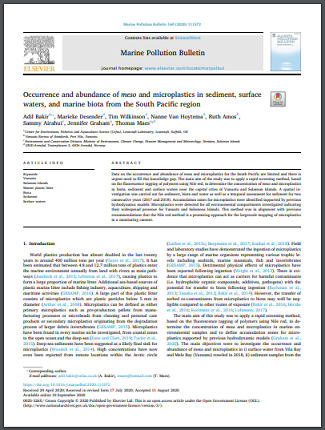
Data on the occurrence and abundance of meso and microplastics for the South Pacific are limited and there is urgent need to fill this knowledge gap. The main aim of the study was to apply a rapid screening method, based on the fluorescence tagging of polymers using Nile red, to determine the concentration of meso and microplastics in biota, sediment and surface waters near the capital cities of Vanuatu and Solomon Islands. A spatial investigation was carried out for sediment, biota and water as well as a temporal assessment for sediment for two consecutive years (2017 and 2018). Accumulation zones for microplastics were identified supported by previous hydrodynamic models. Microplastics were detected for all environmental compartments investigated indicating their widespread presence for Vanuatu and Solomons Islands. This method was in alignment with previous recommendations that the Nile red method is a promising approach for the largescale mapping of microplastics in a monitoring context.














